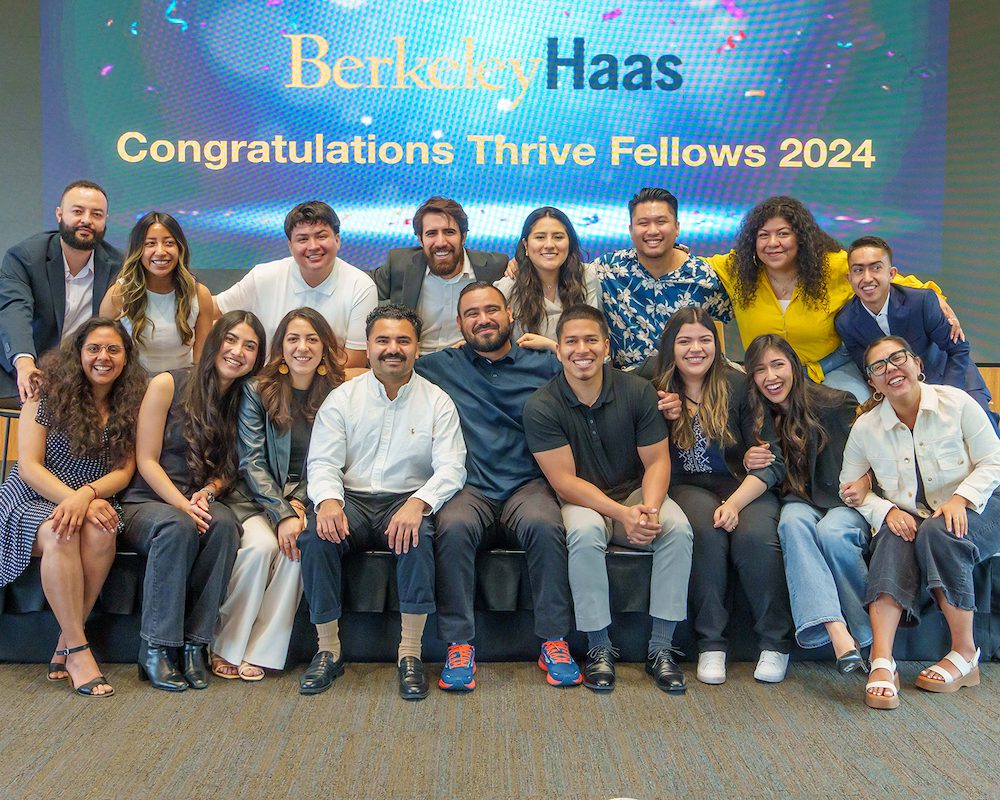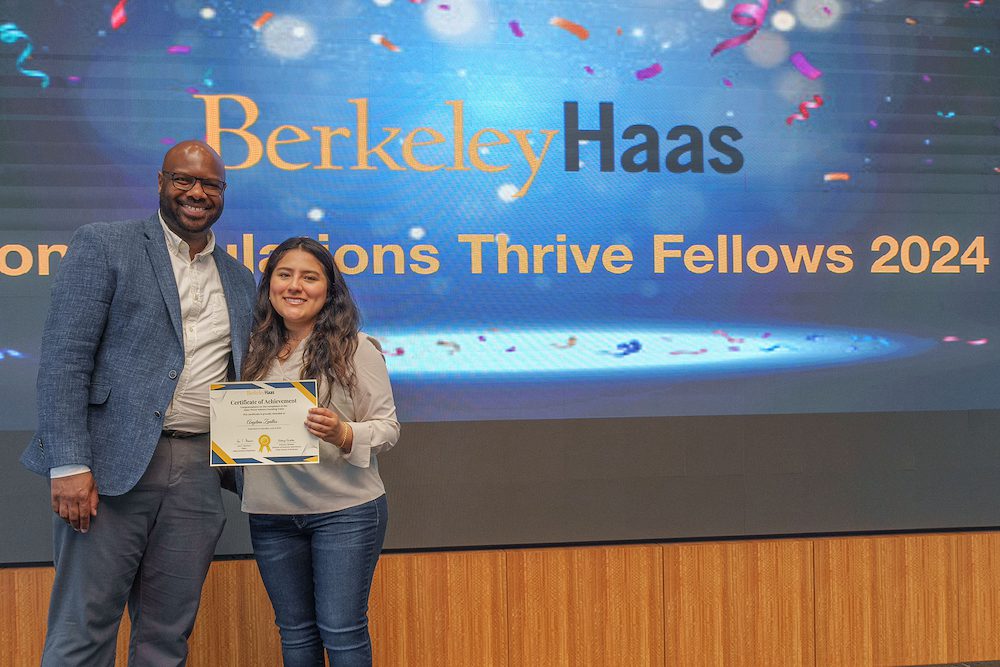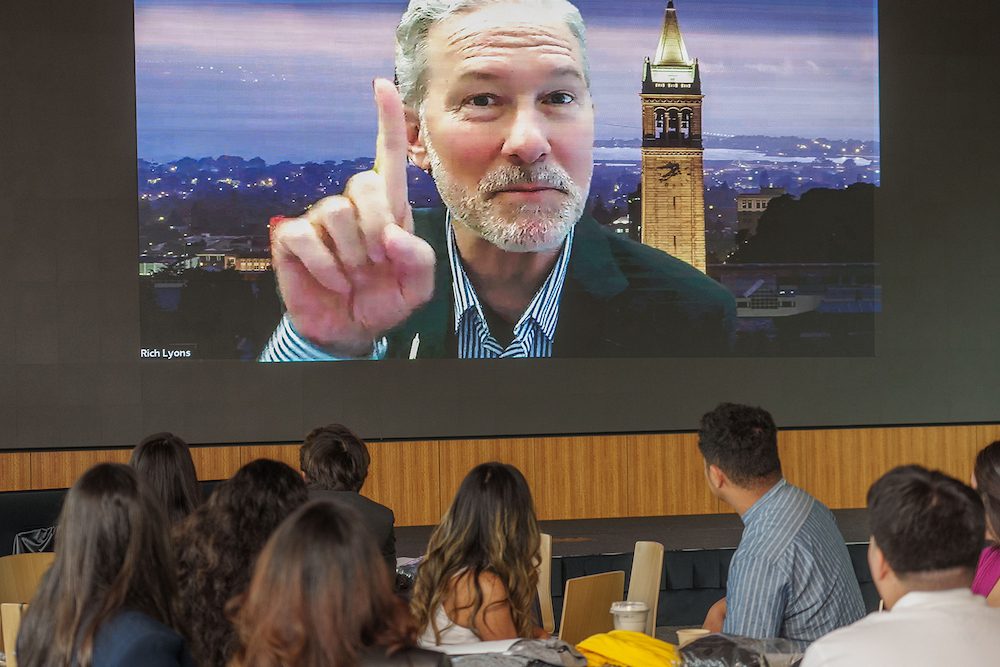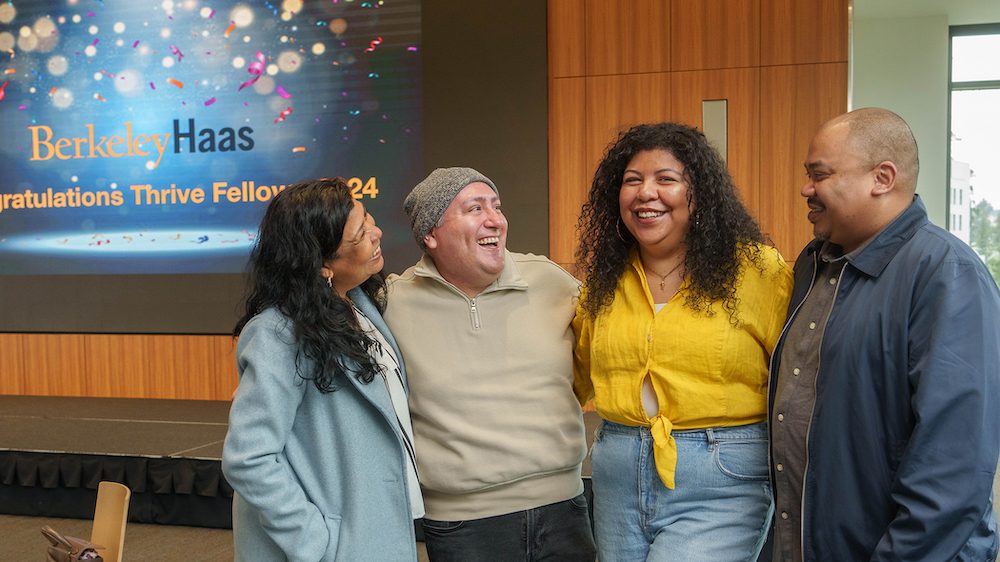EMBA Immersions: Unrivaled Access, Unanticipated Growth
SCHOOL NEWS
Haas News

A new Berkeley Haas program that’s helping Latinx students navigate acceptance into top-tier MBA programs celebrated its first cohort of graduates last weekend.
The June 8 ceremony capped the inaugural year of the Haas Thrive Fellows MBA pipeline program, which brought together Latinx students and professionals for a year-long deep dive into the intense MBA admissions process—everything from prepping for entrance exams to mapping a career trajectory to developing a personal narrative to applying for financial aid to bolstering interviewing skills.
“I have nothing but good things to say about Thrive,” said Amy Camacho Mayorga, BS 24, who as a 2024 Thrive Fellow recently applied to the full-time MBA program at Haas under Accelerated Access, a program that allows a two- to five-year deferment period for professional experience. “I felt like I was being seen and everything was so empowering.”
Mayorga was among a cohort of seven undergraduate seniors, like herself, and 20 working professionals who completed the program, which included free GMAT test preparation and test sitting, along with an application fee waiver for Haas graduate programs.

The program’s goal is to encourage more Latinx candidates to apply to MBA programs at a time when fewer students from underrepresented racial groups are applying nationwide. This year, less than 8% of Berkeley Haas MBA students identified as Hispanic or Latino.
“Applying to a top tier business school has its challenges, but is a manageable process with support,” said Anthony Whitten, director of Diversity Admissions at Berkeley Haas, who launched Thrive Fellows last fall with the help of a seed donation from Adrien Lopez Lanusse, MBA 99, and two successful rounds of crowdfunding. “From test prep to interviewing to essay writing and recommendation letter gathering, there are a lot of boxes to check.”
The benefits of earning an MBA from a top-ranked business school are profound, Whitten said. An MBA program allows students to explore new industries or functions, accelerate their career paths, increase their life-long earning potential, and expand and diversify their networks.

UC Berkeley Chancellor-Elect Rich Lyons, former Berkeley Haas Dean, congratulated the students in a video played at the ceremony in Spieker Forum. Lyons emphasized the role an MBA plays in changing a person’s life and identity, something he said that students don’t understand before they earn the degree. While neither of his parents held a four-year degree, Lyons noted that he graduated from UC Berkeley and went on to earn a PhD. “Many of you, not all, are (part of a) first-gen advanced degree group,” he said, noting how UC Berkeley opened possibilities for him and that the school is an “astonishing social mobility engine.”
For Gina R. Garcia, senior associate director with the Berkeley Haas Career Management Group who helped develop the Thrive Fellows program, graduation provided a moment to reflect on the program’s growth over the past year. “It’s wonderful to think that I was a part of this important moment for our founding fellows,” said Garcia, who is also first-gen in her family to go to college and earn an advanced degree, and serves as the chair for the UC Berkeley Cal Women’s Network (CWN). “It’s a huge deal and I couldn’t be more proud.”
Jorge Rodriguez, a first-generation college graduate with eight years of career experience in public policy, said he found applying to an MBA program daunting before becoming a fellow.
“I didn’t know what it took, in terms of the year-long process of prepping for the test, crafting a story in a way that makes sense to be competitive, and to be seen as a strong candidate,” he said. “As a first-generation college student, it’s a world that I knew nothing about.” Rodriguez’s work paid off; he will enter the Berkeley Haas FTMBA class of 2026 this fall.
Mayorga, also a first-generation college student, said part of what empowered her as a Thrive Fellow was being in a room with people like her.
“It allowed us to be vulnerable with each other,” she said. “People shared very personal experiences they’d faced in the workforce or in school. I feel like that allowed us to have more authentic conversations.”

The Thrive Fellows program aligns with UC Berkeley’s 10-year plan to become a Latinx Thriving Institution, by enrolling and educating more Latinx students. Whitten is now accepting applications for a second Thrive Fellows cohort. “Ultimately, our focus is centered around empowering, enabling, and really allowing people to achieve their aspirations or goals, regardless of whether or not they’re at Haas or another top business school,” he said.
Posted in:
Topics: